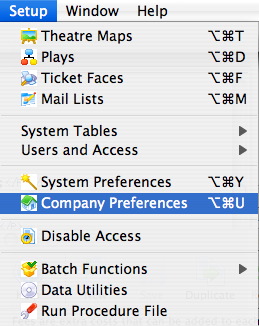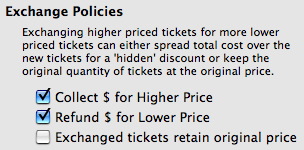Exchanging Hints
Techniques to Reduce Errors during Exchanges
Errors can occur during a ticket exchange when:
- The differences in the price of the original ticket and the replacement ticket is not collected or refunded correctly.
- The amount not refunded or collected is waived by Theatre Manager. Click here for more information on Waived Amounts.
- The ticket base price and sales promotion for the replacement ticket does not match the ticket base price and sales promotion of the original ticket.
It is recommended to:
- Use the Quick Exchange process for festival ticket exchanges when there is no difference in the price of the original tickets and the replacement tickets.
- Turn off automatic waiving to prevent accidental waiving of the difference between the price of the original tickets and the replacement tickets when an incorrect replacement ticket was purchased.
Use Quick Exchange
Quick exchange is a fast exchange procedure that automatically applies the same price and sales promotion on a replacement ticket as was on the original ticket.
- When the original ticket and the replacement ticket are not of the same value a warning appears indicating there is a difference in ticket values.
- The operator is not required to select the price code or the promotion code during the exchange.
- The price and promotion code on the original ticket is automatically applied to the replacement ticket.
- The operator can cancel the Quick Exchange and complete a regular exchange, if required.
- If quick exchange is used and an amount is accidentally waived, a regular exchange can be used to reverse the waived amount.
Turn Off Automatic Waiving
Turning off automatic waiving requires the employee to decide if any difference between the original tickets and the replacement tickets is to be refunded or collected. Select both checkboxes to collect money for higher priced tickets and to refund money for lower priced tickets.
To examine the current settings:
- Access to the Company Preferences is through the Setup menu.

- Select the Box Office tab.

When the settings for Collect $ for Higher Price and Refund $ for Lower Price are deselected, the price difference in the exchange process is automatically waived. Change the setting to allow the employee to decide to waive, collect, or refund the price difference in the exchange.
| The following quick reference information is available for Exchanging or Refunding Tickets |
Reference Guide (pdf) |
Cheatsheet (pdf) |
Flash ScreenCast |
MP4 ScreenCast |
Ticket Sales - Uneven Exchange
An uneven ticket exchange is when the number of tickets that are being exchanged 'from' is less then the number of tickets that are being exchanged 'to'. This can occur if a patron is exchanging 2 tickets for a HIGH priced night into a LOW priced performance, and also request an additional ticket for their friend at the same time.
Exchanging higher priced tickets for a greater quantity of lower price tickets can cause Theatre Manager to either:
- Spread the total cost over the new tickets for a 'hidden' discount
-or-
- keep the original quantity of tickets at the original price and charge more for the additional tickets.
If the 'hidden' discount is not what the organization want to happen and the organization would like the patron to pay the full purchase price for the additional ticket, there is a setting in the Box Office Tab of Company Preferences that allows exchanged tickets to retain original prices when performing an uneven ticket exchange.
The following table shows examples of what Theatre Manager will do if the flag is OFF (cost is spread over new tickets) or ON (tickets retain original price). The results vary depending on the settings for 'Refund $ for lower priced tickets' and 'Collect $ for higher priced tickets'
| Scenario | Examples | Retain original Price Flag | Refund $ for lower priced tickets | Collect $ for higher price tickets | Result |
|---|---|---|---|---|---|
| Waive price difference for more lower priced tickets | 2 HI @ $50 for 3 LOW @ $30 | OFF | OFF | n/a | Patron pays nothing.
The the cost is spread over new tickets. The Patron pays $0.00 for the
additional ticket purchased. In effect, the price difference is 'waived'
between the 3 tickets ($10.00 price difference / 3 tickets = $3.33
additional per ticket). Transactions generated are:
|
| Waive price difference for higher priced tickets | 2 LOW @ $50 for 2 HI @ $60 | OFF | n/a | OFF | The patron pays $0.00 for the additional ticket purchased. In effect, the price difference is
'waived' between the 2 tickets ($20.00 price difference / 2 tickets =
$10.00 less per ticket). Transactions generated are:
|
| Collect price difference for more lower priced tickets | 2 HI @ $50 for 4 LOW @ $30 | OFF | n/a | ON | Patron pays $20.00 for the price difference. In this case, because the "Exchange tickets
retain original price" is turned OFF and the total $ value of the tickets
purchased is higher than the returned tickets, the patron is just paying
the total difference between the original and new tickets. Transactions
generated are:
|
| Refund price difference for lower priced tickets | 2 HI @ $50 for 2 LOW @ $30 | OFF | ON | n/a | Patron gets a refund of $40.00. The patron gets a refund for the difference between the
original priced tickets and the new tickets. Transactions generated
are:
|
| Collect price difference on all higher priced tickets | 2 LOW @ $50 for 3 HI @ $60 | n/a | n/a | ON | Patron pays $80.00. The patron just pays the price difference for the two higher priced tickets, plus the additional ticket. The flag "Exchange tickets retain original price" has no effect as the new
tickets are higher priced than the original tickets. Transactions
generated are:
|
| Collect only for new additional ticket | 2 HI @ $50 for 3 LOW @ $30 | ON | n/a | ON | Patron pays $30.00. The original ticket values of $50.00 each is transferred to the new tickets and the patron just pays for the additional ticket. The flag "Exchange tickets retain original price" does have an effect as the new tickets are were originally at a lower price than
the original tickets. Transactions generated are:
|
Click here, to view the above table in a printable pdf file.
When does "Exchange Tickets retain original price" have an effect?
The following conditions must be true:
- The flag "Exchange tickets retain original price" must be ON.
- The total number of new tickets must be greater then the number of original tickets exchanging 'from.'
- No 'waiving' of $ Refund or $ Collect must be taking place.
- All new tickets must each have a quantity of 1 (i.e. no group festival tickets).
- There must be at least one ticket price 'lower or equal to' in the original tickets than the new tickets being purchased.
|
When on the payment window, if the organization chooses to 'waive' the price difference for any reason (i.e. not to refund $ or not to collect higher $), then the "Exchange tickets retain original price" flag is ignored. Theatre Manager will revert to the standard calculations of 'waiving' $ based on evenly distribution between all of the tickets that have a $ total cost associated with them (i.e. excluding complimentary tickets) |
How does Theatre Manager know which new tickets to 'retain original price' when doing an uneven exchange?
Theatre Manager will prompt the user with a list of the new tickets the patron has just purchased asking the user to choose the tickets that the organization wants to have retain the original price.
Can an uneven exchange to 2 or more different events be done at one time?
Yes. However, the user may only wish to do this if all the ticket prices between the performances are the same. For example:
- Event A - $40.00
- Event B - $50.00
Then the patron made a ticket exchange and bought an extra ticket for:
- Event A - $40.00
- Event A - $40.00
- Event B - $30.00
Theatre Manager would indicate that this is an 'uneven ticket exchange' and ask the user to select the 2 tickets that should 'retain the original price'. The user would select:
- Event A - $40.00 *** selected ***
- Event A - $40.00
- Event B - $30.00 *** selected ***
After all the processing the ticket value on for tickets would end up like:
- Event A - $50.00
- Event A - $40.00 - this one does not change as it was not *** selected ****
- Event B - $40.00
The ticket cost for Event A and Event B have been reversed. This is because during the processing, Theatre Manager will 'retain the original cost' as closely to the 'original cost' as possible. Meaning, the NEW ticket with lowest price, will get the lowest price of the original set of tickets. Then the next NEW ticket with the lowest price will get the next lowest price of the original set of tickets, and so on.
In this case, doing an uneven exchange involving different events at the same time is not recommended unless all of the ticket prices are the same. If this is happening, it is then recommended to do each set of tickets for each event separately to ensure that the ticket revenue gets allocated to the proper event.
Exchanging tickets when the new tickets involve complimentary ($0.00 valued) tickets
When complimentary tickets are involved in a ticket exchange and there is 'waived' revenue in effect, Theatre Manager will automatically ignore using those complimentary tickets in the evenly distribution of the 'waived' revenue between the tickets. Only the tickets that have a $ value, will be used in the 'waived' revenue reallocation.
However, if all the new tickets are complimentary (i.e. exchanging from 2 priced tickets to 2 complimentary tickets) then Theatre Manager will use all of the complimentary tickets in the 'waived' revenue allocation. As a result, all the complimentary tickets will have revenue allocated to them.




